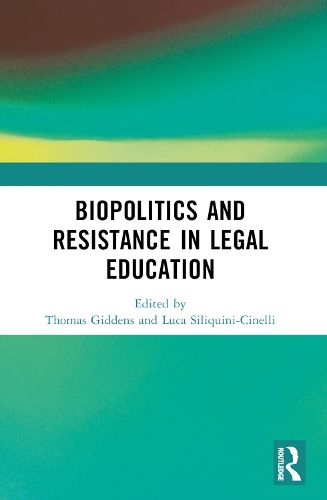Readings Newsletter
Become a Readings Member to make your shopping experience even easier.
Sign in or sign up for free!
You’re not far away from qualifying for FREE standard shipping within Australia
You’ve qualified for FREE standard shipping within Australia
The cart is loading…






Taking up the study of legal education in distinctly biopolitical terms, this book provides a critical and political analysis of resistance in the law school.
Legal education concerns the complex pathways by which an individual becomes a lawyer, making the journey from lay-person to expert, from student to practitioner. To pose the idea of a biopolitics of legal education is not only to recognise the tensions surrounding this journey but also to recognise that legal education is a key site in which the subject engages, and is engaged by, a particular structure-and here the particular structure of the law school. This book explores the resistance to that structure, including: different ways in which law's pedagogic structures might be incomplete, or are being fought against; the use of less conventional elements of cultural discourse to resist the abstraction of the lawyer in students' subject formation; the centralisation of queer and feminist discourses to disrupt the hierarchies of the legal curriculum; the use of digital technologies; the place of embodiment in legal education settings; and the impacts of posthuman knowledges and contexts on legal learning.
Assembling original, field-defining essays by both leading international scholars and emerging researchers, this book constitutes an indispensable resource in legal education research and scholarship that will appeal to legal academics everywhere.
$9.00 standard shipping within Australia
FREE standard shipping within Australia for orders over $100.00
Express & International shipping calculated at checkout
Taking up the study of legal education in distinctly biopolitical terms, this book provides a critical and political analysis of resistance in the law school.
Legal education concerns the complex pathways by which an individual becomes a lawyer, making the journey from lay-person to expert, from student to practitioner. To pose the idea of a biopolitics of legal education is not only to recognise the tensions surrounding this journey but also to recognise that legal education is a key site in which the subject engages, and is engaged by, a particular structure-and here the particular structure of the law school. This book explores the resistance to that structure, including: different ways in which law's pedagogic structures might be incomplete, or are being fought against; the use of less conventional elements of cultural discourse to resist the abstraction of the lawyer in students' subject formation; the centralisation of queer and feminist discourses to disrupt the hierarchies of the legal curriculum; the use of digital technologies; the place of embodiment in legal education settings; and the impacts of posthuman knowledges and contexts on legal learning.
Assembling original, field-defining essays by both leading international scholars and emerging researchers, this book constitutes an indispensable resource in legal education research and scholarship that will appeal to legal academics everywhere.